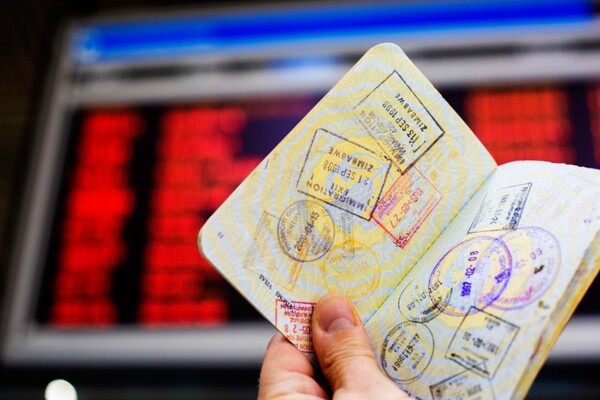Travel facing race against time to get ready for new EU border rules
 Gary Noakes &
Gary Noakes &  Harry Kemble &
Harry Kemble &  Ilaria Grasso Macola
Ilaria Grasso MacolaFor many travellers, 10 November will be the day Brexit gets real. Generations who remember flashing UK passports at EU borders and being nonchalantly waved through immigration are in for a shock.
Since the UK quit the EU in January 2020, Britons have had the novelty of getting a passport stamp on their summer jaunts, but November brings another step change. “From 10 November, tourists going to Europe need to think like they’re going to the US,” Tourism Alliance executive director Richard Toomer tells TTG.
There will be no more passport stamping under the EU Entry-Exit System (EES). Instead, individuals’ movements will be registered digitally every time they enter the bloc.
The downside to this is that new border systems must be loaded with travellers’ information – a biometric facial image and fingerprint scans. And therein lies the potential problem; because this is an EU initiative, these biometrics must be collected at EU airports. It raises the likelihood of long waits at immigration, if not in November, then definitely next summer.
EES will apply in 29 European countries, including Iceland, Norway and Switzerland. Cyprus and Ireland are excluded and will continue to stamp passports, although Irish passport holders – as EU citizens – will be exempt from EES. Travellers’ biometric data will need to be renewed every three years.
EU home affairs commissioner Ylva Johansson has insisted EES will apply “at every single airport, every single harbour, every single road into Europe” and will “all [be] switched on at the very same time”.
UK airports will be heaving sighs of relief they are not responsible for implementing EES. AirportsUK policy manager Dr Rupinder Pamme confirms: “This requirement is on entry to the EU so will not affect returning passengers. We do not envisage any impact on UK airports.”
There will, though, be an impact in the UK at departure points where there are dual British and French borders – Dover (ferries), St Pancras (Eurostar) and Folkestone Eurotunnel. At these locations, checks will happen at passport control upon departing the UK.
A Eurostar spokesperson tells TTG: “We will be fully prepared for EES and have made significant investments to ensure our customers continue to enjoy seamless travel.”
’Significant complexities’
Others do not share this confidence. Iata has warned of unresolved – albeit unspecified – technical issues, with many ports still to install the equipment needed to record the necessary information and biometrics.
Aena, whose 48 airports in Spain processed almost 32 million passengers in July alone, says it is “working on the supply and installation of the necessary equipment for the deployment of EES”.
Abta chief executive Mark Tanzer tells TTG that while he would welcome some flexibility on the EU’s part, the roll-out had the potential to be “a bit torturous”.
“We’re encouraging destinations to take a soft approach because I’m not convinced all ports will have the equipment, systems and channelling in place,” he cautions.
“Once we’ve gone through the initial pain of registering for the first time, it’ll probably be worth it. I think the process of getting there will be a bit torturous.”
Tanzer says Abta will work with the UK government to spread the word. The association has published guidance for the trade on its member zone and will host a conference call for members in September.

Luke Petherbridge, Abta’s director of public affairs, adds: “It’s really important the industry takes time to understand the new system and what it will mean for their customers and their businesses.”
Indeed. And EES is just the start, with the EU’s visa waiver scheme Etias (European Travel Information and Authorisation System) set to follow next May, bringing additional requirements for travellers and potential headaches for agents.
Julia Lo Bue-Said, chief executive of the Advantage Travel Partnership, warns the launch of EES and Etias “will add significant complexities for many travellers who are not clear on what this means for them and their travel plans to the EU”.
She is calling for an awareness campaign ahead of next summer. “Right now, there is very limited public awareness of what this means for anyone expecting to travel to Europe from outside the EU,” Lo Bue-Said warns. “As we get closer to launch and key travel periods, clear and transparent communication will be vital.
“Safety and security are, of course, paramount, but it’s crucial the government and the travel industry work together to make sure Brits have a thorough understanding of the new systems when they come into effect and how they will impact travel.”
Vital preparation
Toomer is also wary: “I don’t think we’re ready. I think the industry has done a lot, if you look at Dover, St Pancras and Folkestone, but they’ve been hampered by not having a date to work to. They’ve been preparing with one hand behind their back.”
The new Labour government, perhaps unsurprisingly, is far from impressed with the preparatory work done by the previous Conservative administration. Earlier this year, immigration minister Seema Malhotra said she was “not content” with the UK’s preparedness, echoing the findings of a House of Lords committee in May.
Summer 2025 is the likely flashpoint. Etias will be like the US Esta scheme, with online registration costing €7/£6. It will be valid for three years or until people’s passports have three months or less validity, whichever is first. Etias will be free for under-18s and over-70s and will be needed to travel to 30 countries, including Cyprus, Iceland, Norway and Switzerland.
Unlike EES, Etias will place some onus on the travel industry, with air and sea carriers required to verify 48 hours prior to departure whether any visa-exempt travellers have a valid Etias authorisation. International coach operators will have three years to comply with this requirement.
One potential pitfall will be with rail operators, who will not check whether passengers have an Etias when booking, but prior to boarding. “There needs to be much more thought about the journey,” Toomer insists. “It comes down to a massive communications campaign. It’s our tourists that are going to be affected.”
Aito, meanwhile has called on all border control forces to "take full advantage of the precautionary measures available" and will "relax checks where waiting times are excessive. It has also called for any transition period, expected to be an initial six months, to be extended into the summer peak season.
There are bound to be pinch-points, particularly at Europe’s airports. One consolation is the British are renowned worldwide for their talent for orderly queuing. That patient virtue may well be tested over the coming months and years.
Sign up for weekday travel news and analysis straight to your inbox

Gary Noakes

Ilaria Grasso Macola

Harry Kemble
Supplier Directory
Find contacts for 260+ travel suppliers. Type name, company or destination.













